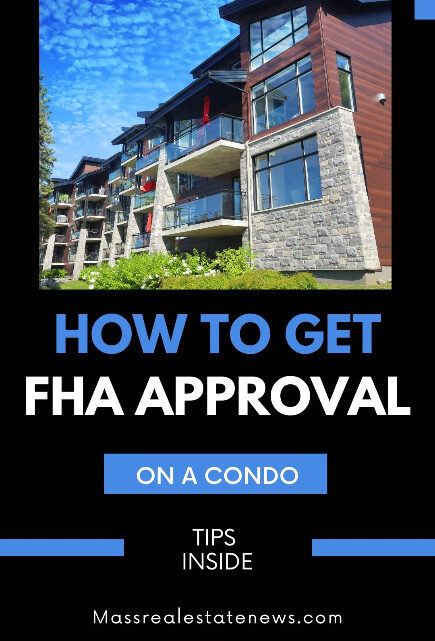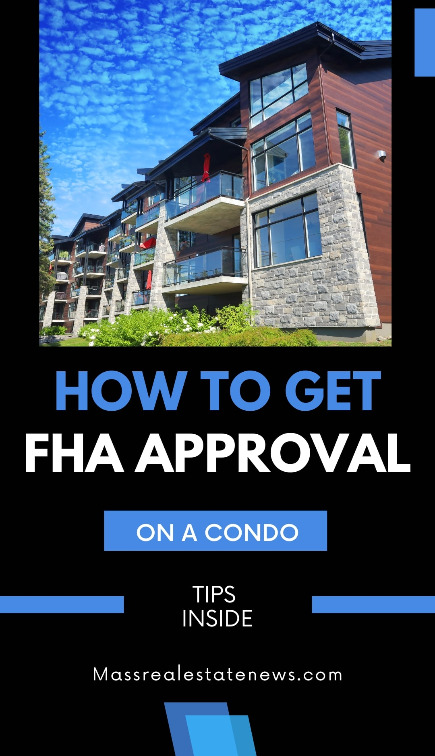Obtaining FHA condo approval in Massachusetts involves meeting specific requirements set by the FHA.
These requirements include criteria such as occupancy percentage, low delinquency rate in condo fees, financial stability of the homeowners association, and adherence to physical condition and insurance standards.
It is similar to having a warrantable condo because it is far more appealing to buyers and lenders.
To apply for approval, necessary documentation must be collected and submitted to HUD for review. As an owner, getting on the FHA condo approval list is essential. By doing so, you make your home more accessible to potential buyers.
The Benefits of FHA-approved condos include access to FHA mortgage programs, attracting more buyers, and a potential increase in property value.
Pros and cons of buying an FHA-approved condo include flexible credit and down payment requirements, lower interest rates, and mortgage insurance premiums.
Overview of FHA Condo Approval
Obtaining FHA condo approval in Massachusetts is a crucial step for individuals looking to finance their purchase of a condominium through an FHA-insured loan. This approval signifies that the condominium project meets the requirements set forth by the Federal Housing Administration (FHA).
Before delving into the requirements and application process details, it’s essential to understand the significance of FHA condo approval. This approval opens opportunities for potential buyers by providing access to FHA mortgage programs, which often come with more flexible credit and down payment requirements.
Furthermore, purchasing an FHA-approved condo can lead to lower interest rates and the need to pay mortgage insurance premiums.
While the process may seem daunting, having an FHA-approved condominium benefits buyers and enhances the property’s marketability and value.
With these advantages in mind, let’s explore the requirements and steps in obtaining FHA condo approval in Massachusetts.
FHA Condo Approval Requirements
Obtaining FHA condo approval in Massachusetts entails meeting specific Federal Housing Administration (FHA) requirements.
These requirements ensure that the condominium project is suitable for FHA-backed financing.
Here are the critical criteria that a condominium must fulfill to obtain FHA approval:
Occupancy Percentage Criteria
- An FHA-approved condominium project must have a minimum of 50% of its units occupied by the owners.
Low Delinquency Rate in Condo Fees
- The condominium association should have a low delinquency rate regarding the payment of HOA fees and assessments.
Financial Stability of the Homeowners Association
- The homeowners association must demonstrate financial stability, including sufficient reserves for maintenance and repairs.
Physical Condition Standards
- The condominium project must meet specific physical condition standards the FHA sets, ensuring it is safe and habitable for residents.
Insurance Requirements
- The condominium association should have adequate hazard and liability insurance coverage for the project.
Meeting these requirements ensures that the condominium project meets specific occupancy, financial stability, and safety standards, making it eligible for FHA-backed financing.
By adhering to these criteria, condominium associations can offer potential buyers the benefits of FHA financing and attract a broader range of interested parties.
Applying for FHA Condo Approval
Gathering Required Documentation
Applying for FHA condo approval in Massachusetts requires gathering the necessary documentation to demonstrate compliance with FHA requirements.
This documentation includes the following:
- Completed FHA Condominium Approval Application
- Condominium Legal Documents: Articles of Incorporation, Bylaws, and Covenants, Conditions, and Restrictions (CC&Rs)
- Financial Statements: Balance sheets, income and expense statements, and reserve study
- Master Insurance Policy: Providing coverage for all common areas and liability coverage
- Owner-Occupancy Documentation: Including a list of current owner-occupied units
- Delinquency Rate Report: Showing the percentage of owners delinquent on their condo fees
- Management Company Information: Contact details and contract agreement
- Physical Condition Report: Detailing the overall condition of the condominium complex
- HUD-Approved Budget: Providing a detailed budget and financial plan for the condominium association
Submitting the Application to HUD
Once you have gathered all the necessary documentation, it’s time to submit the FHA Condominium Approval Application to the Department of Housing and Urban Development (HUD). This can be done electronically through the FHA Connection website or by mailing a physical copy to the appropriate HUD Regional Office.
The Review Process and Timeframe
After applying, HUD will review the documentation to ensure compliance with FHA requirements. The review process can take weeks to months, depending on the application’s complexity and HUD’s current workload.
During this time, any additional documentation or clarifications requested by HUD should be promptly provided to expedite the review process.
It is important to note that meeting the FHA condo approval requirements does not guarantee automatic approval.
Each application is evaluated on a case-by-case basis. Once the review is complete, HUD will notify the condominium association of the approval status.
Benefits of FHA-Approved Condos
When purchasing a property in Massachusetts, opting for an FHA-approved condo can offer several advantages.
Let’s explore these benefits in detail:
Access to FHA Mortgage Programs
One of the significant benefits of purchasing an FHA-approved condo is its access to FHA mortgage programs. These programs offer favorable terms and conditions, including lower down payment requirements and more flexible credit qualifications than conventional loans.
This can make homeownership more attainable for many potential buyers.
More Potential Buyers
By obtaining FHA condo approval, sellers can attract more potential buyers. FHA-approved condos are eligible for government-backed financing, which means buyers who may not qualify for conventional loans can still secure a mortgage for an FHA-approved property.
This expanded buyer pool increases the chances of finding a suitable buyer and selling the condo quickly.
Potential Increase in Property Value
FHA approval can also contribute to an increase in property value. With the availability of FHA financing, demand for the condo may rise, leading to a potential appreciation in value.
Additionally, FHA approval signifies that the condo meets specific standards set by the Federal Housing Administration, reassuring buyers about the property’s quality and desirability.
Opting for an FHA-approved condo in Massachusetts can open doors to financing options, attract more buyers, and potentially increase the property’s value. These advantages make it a compelling choice for sellers and buyers in the competitive real estate market.
Pros and Cons of Buying an FHA-Approved Condo
Flexible Credit and Down Payment Requirements
One of the significant advantages of buying an FHA-approved condo is the flexible credit and down payment requirements. Unlike conventional loans, FHA loans often have lower credit score requirements, making it easier for individuals with less-than-perfect credit to qualify.
Additionally, the down payment requirement for FHA loans can be as low as 3.5% of the purchase price, which can benefit homebuyers who may not have a large down payment saved.
Lower Interest Rates
Another benefit of purchasing an FHA-approved condo is the potential for lower interest rates. FHA loans are backed by the Federal Housing Administration, which can result in more competitive interest rates compared to conventional loans.
Having this type of mortgage can lead to significant savings over the life of the loan, making homeownership more affordable in the long run.
Mortgage Insurance Premiums
When buying an FHA-approved condo, one consideration is the requirement for mortgage insurance premiums (MIP).
MIP is an insurance policy that protects the lender in case the borrower defaults on the loan. While it adds cost to the monthly mortgage payment, it allows individuals with lower credit scores and smaller down payments to qualify for financing.
It’s essential to weigh the cost of MIP against the benefits of FHA financing to determine if it aligns with your long-term financial goals.
Finding FHA-Approved Condos in Massachusetts
You can explore a few avenues when searching for FHA-approved condos in Massachusetts. Here are some options to consider:
Using HUD’s Search Tool
The U.S. Department of Housing and Urban Development (HUD) provides a convenient search tool for FHA-approved condos in Massachusetts.
Visit HUD’s website and navigate to their search tool page. From there, you can enter the desired location, such as a city or zip code in Massachusetts, and filter the results to display only FHA-approved condos.
Engaging the Condo Association for Approval
If you have identified a condominium that interests you but is not currently FHA-approved, you can try engaging the condo association to pursue FHA approval.
Contact the association and inquire if they have considered or are willing to pursue FHA approval. Assisting them in the application process and highlighting the benefits of FHA approval, such as increased marketability, may encourage them to seek consent.
Considerations for Conventional Loan Options
If you cannot find an FHA-approved condo or the condo association is unwilling to pursue FHA approval, you still have alternative financing options. Conventional loan programs, offered by various lenders, can provide financing for non-FHA-approved condos.
These loans may have different eligibility criteria and down payment requirements, so exploring your options and working with a qualified lender who can guide you through the process is essential.
Remember, whether you choose to pursue an FHA-approved condo or explore conventional loan options, it’s crucial to carefully review and compare the terms, conditions, and eligibility requirements before deciding.
Working with experienced professionals, such as real estate agents and mortgage lenders, can provide valuable guidance and assist you in finding the best financing solution for your needs.










No Comment